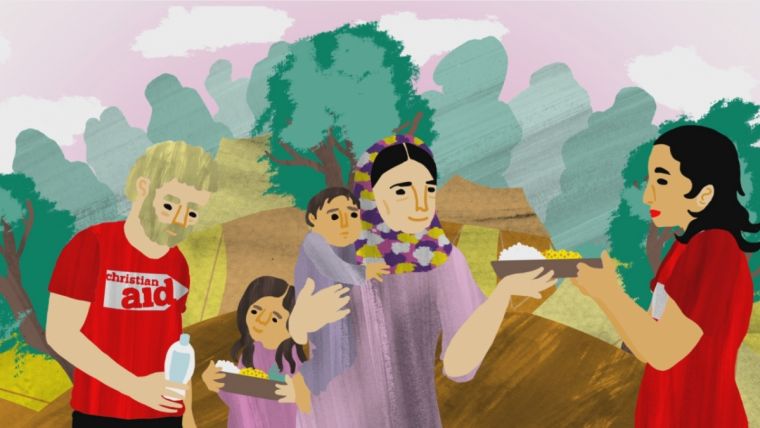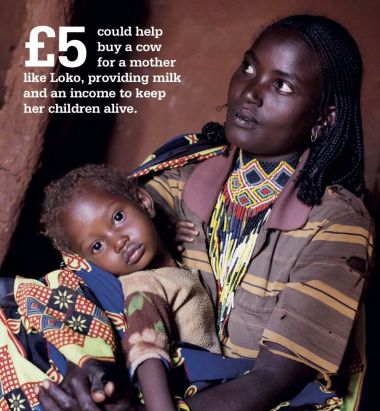Analysis: What does it mean for a charity to call itself Christian?

When the charity Christian Aid unveiled its most recent logo, there was consternation among some conservative Evangelicals because the design increased the size of the word 'aid' and decreased the word 'Christian'. Around the same time, the charity ran an advert that provocative declared: 'Christian Aid doesn't just give Christians aid. That wouldn't be very "Christian", would it?'
The anxiety was focused on this question: what does it mean for a charity to call itself Christian?
Four of Britain's largest international Christian aid agencies are Christian Aid (annual turnover £107m in 2015-16), World Vision (£95m), Tearfund (£72m), and Cafod (£53m).
Gone are the days when it is acceptable for a charity to use aid as a 'front' for evangelism. Charities depend on the trust of their supporters, who would be scandalised by such a practice in a way that previous generations may not have been. Agencies also have to safeguard their staff, who may be working in areas of religious or ethnic conflict where apparently favouritising one community over another could put their lives at risk. Indeed, the Red Cross Code of Conduct, to which all four agencies are signatories, spells out: 'Aid is given regardless of the race, creed or nationality ... Aid will not be used to further a particular political or religious standpoint'. So big donors such as the Department for International Development (DfID) or the UN refugee agency, UNHCR, insist on non-discrimination, to ensure equal access to aid.
However, this approach is being challenged. An increasingly visible issue in the Middle East and parts of Africa and Asia is religious persecution. Can persecuted Christians expect solidarity from their wealthier Western brothers and sisters?
Yes and no. People who are persecuted for their faith are sometimes materially poor, but not always. While the larger Christians agencies may have previously helped victims of religious persecution, albeit below the radar, these days they are keen to stress their commitment to non-discrimination, especially if much of their income comes from donors who require it.
This has prompted the religious activist Nina Shea in the US and the Lord Carey, the former archbishop of Canterbury, to accuse their respective governments and UN of failing Middle Eastern Christians threatened by Islamic State. In their separate interventions, in the Wall Street Journal and the Telegraph respectively, they said the non-discrimination policy meant aid did not reach Syrian and Iraqi Christians. According to Lord Carey, Christians were 'not to be found in UN camps ... invariably run by Muslim officials who are often hostile to minorities'. While the UNHCR and DfID deny this, the vast scale of the UN's operation in Iraq and Syria makes investigation virtually impossible.
There are smaller, specialist charities such as Open Doors or the Catholic agency Aid to the Church in Need, which exist to support Christians who are persecuted rather than to alleviate poverty. These organisations are less likely to apply for grants from donors who require them not to favouritise.
Any religious aid agency operates in tension between the ideals of their supporters, the complex realities of suffering, and a secular market-place that may be wary of Christian beliefs and practices, especially regarding sexual ethics. This is why charities may emphasise their religious ethos to some audiences and play them down to others. Some Christian charities effectively adopt the maxim of St Francis of Assisi: 'Preach the Gospel at all times. When necessary, use words.'
For example, Christian Aid's Head of Church Advocacy, Policy and Public Affairs, Dionne Gravesande, told Christian Today: 'We believe that every human being is created in the image of God, and should have a life of dignity and worth. Our essential purpose is to expose the scandal of poverty.' Cafod said in a statement: 'We don't preach ... We believe our values are best shown through working for justice and an end to poverty.'

How explicit should a religious charity be? Pope Benedict XVI feared that the spiritual dimension of Catholic aid work could be lost amid secular approaches to charity. Archbishop Paul Cordes, the head of the Vatican's charitable arm, said at the start of Benedict's papacy in 2005: 'Sometimes, Christ's message is reduced to that which interests public opinion: justice, peace, and quality of life. It is rare when one speaks about sin, love of God and eternal life.' Later, in 2009, he added that helping the poor was the means by which to bear Christian witness, and that it was important not to absorb the priorities of 'organisations alien to the Church'.
This did not go down well among all Catholic aid experts, not least with the head of the international Catholic aid network Caritas, Lesley-Anne Knight. She did not share his views, and it was apparently this that led to her not being re-appointed in 2011 for a second term in office.
Another question for religious charities is whom they should employ, or work with. Tearfund says it aims to employ Christians, both in the UK and overseas, 'to reflect values we want to see in our programmes'. Christian Aid requires its senior UK staff to be Christian; Cafod requires only its CEO to be Catholic, but both agencies naturally attract many Catholic or Christian staff.
Christian Aid argues that in the field, by employing people irrespective of faith, they can 'help people in Muslim countries that other NGOs, who only work with Christian organisations, can't always reach'. This question – whether to have as partner organisations only Christian organisations or some non-Christian ones – has sometimes proved divisive: it caused a split in Tearfund's ethical trading operation in the 1970s, with Tearcraft (now defunct) insisting on working only with Christian partners and its founder Richard Adams leaving to form Traidcraft, to work also with non-Christians.
Peter Keegan, government relations manager of World Vision UK, says that while World Vision mainly employs Christians, what is most important are shared values, namely 'justice, love and hope'. He adds: 'We know that God can work through all people ... and often find that as a Christian organisation we are able to build strong relationships of trust with local faith leaders and communities of all faiths.' Keegan cites a pastor and an imam in Sierra Leone who, after attending the charity's training, worked together to educate their respective congregations how to prevent the spread of the deadly Ebola virus.
So Christian charities operating both in multi-faith and secular environments wear their faith identity in different ways according to how they understand their mandate and tackle the complex question: 'What would Jesus do?'











